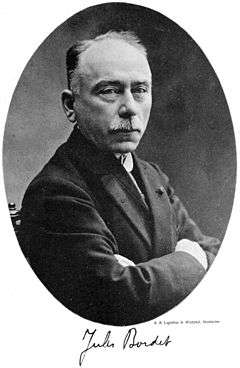Jules Bordet
| Jules Bordet | |
|---|---|
|
Jules Bordet | |
| Born |
Jules Jean Baptiste Vincent Bordet 13 June 1870 |
| Died | 6 April 1961 (aged 90) |
| Resting place | Ixelles Cemetery |
| Alma mater | Free University of Brussels |
| Notable awards | |
Jules Jean Baptiste Vincent Bordet (13 June 1870 – 6 April 1961) was a Belgian immunologist and microbiologist. The bacterial genus Bordetella is named after him.
Education and early life
Bordet was born at Soignies, Belgium. He graduated as Doctor of Medicine from the Free University of Brussels in 1892 and began his work at the Pasteur Institute in Paris in 1894, in the laboratory of Elie Metchnikoff, who had just discovered phagocytosis of bacteria by white blood cells, expression of the cellular immunity. In 1898, Bordet described hemolysis evoked by exposure of blood serum to foreign blood cells.
Career
In 1900, he left Paris to found the Pasteur Institute in Brussels, and made his discovery that the bacteriolytic effect of acquired specific antibody is significantly enhanced in vivo by the presence of innate serum components which he termed alexine (but which are now known as complement). This mechanism became the basis for complement-fixation testing methods that enabled the development of serological tests for syphilis (specifically, the development of the Wassermann test by August von Wassermann). The same technique is used today in serologic testing for countless other diseases.
With Octave Gengou, he isolated Bordetella pertussis in pure culture in 1906 and posited it as the cause of whooping cough. He became Professor of Bacteriology at the Université Libre de Bruxelles in 1907.
Awards and honours
In March 1916, he was elected a Fellow of the Royal Society[1] and in 1930, delivered their Croonian Lecture.[2] In this lecture, Bordet also concluded that bacteriophages "the invisible virus of Felix d'Herelle", a self-taught microbiologist, did not exist and that the bacteria themselves produce the lytic principle. He was to be proven incorrect later with bacteriophage therapy then recognised as an alternative/complementary therapy in the fight against bacterial infections, starting with the treatment of patients in Paris by Felix d'Herelle.[3] The Nobel Prize in Physiology or Medicine was awarded to him in 1919 for his discoveries relating to immunity.
Bordet died in 1961 and was interred in the Ixelles Cemetery in Brussels.
References
- 1 2 Oakley, C. L. (1962). "Jules Jean Baptiste Vincent Bordet 1870-1961". Biographical Memoirs of Fellows of the Royal Society. 8: 18. doi:10.1098/rsbm.1962.0002.
- ↑ "Librart and Archive Catalogue". Royal society. Retrieved 18 December 2010.
- ↑ Hausler, Thomas (2007) Viruses Vs. Superbugs: A Solution to the Antibiotics Crisis? Palgrave Macmillan. ISBN 0230551939
- Jules Bordet (Frederick P. Gay translator) (1909) Studies in Immunity, John Wiley & Sons, link from Internet Archive.
External links
- Works by or about Jules Bordet at Internet Archive
- a longer Biography page at Jules Bordet Institute
- The Nobel Prize in Physiology or Medicine 1919
- Jules Bordet Institute
- Jules Bordet at Find a Grave
